|
Daily Life in Phnom Penh
4 January 2002
Officially we are in the "cool" season now (as opposed to the "hot" and "rainy" seasons--we only have three), and--wonder of wonders--it has actually been less hot the last four or five days. It wouldn't be cool by my standards--it's never been below 79 degrees in my room, but it's sure a pleasant change from the more usual high 80s or low 90s that are common at this time of the year. I'll take it!
Return to Top of Page
24 November 2001
Our electricty went out again a few days ago, and this time it was obviously a fault on our property, and more specifically, in our little electrical shed where all the wires from the house circuits are connected to the wire from the pole. Basically it was a mess of tangled, dirty wires just twisted together with no circuit breakers but only a smaller piece of copper wire used as a fuse. This time the landlord agreed to fix it and today he sent a three-man crew over to start moving all the wiring from the little shed to another connection point on the other side of the property. Our power was off all day, and the work will continue tomorrow. The bill for three men working two days and installing new wiring and circuit breakers will be $75! It probably would have been $7,500 in the US!
Return to Top of Page
18 November 2001
A most pleasant surprise upon returning to Phnom Penh a few days ago was the pleasant temperature. Normally Cambodia has only two seasons: hot and dry and hot and wet. But this morning the temperature in my room was 79.5°F and it only got up to 85° during the afternoon, not bad at all when combined with the low humidity and a fresh breeze. But what I consider not bad may have been too much for some locals who are these days sporting sweaters--and one man I saw yesterday had on a heavy cap, with the ear flaps turned down!
Return to Top of Page
22 September 2001
The past year has seen many changes in Cambodia's laws about automobiles. For starters, drivers are now supposed to register their cars and get license plates. Not a very novel idea for most of the world but a new one for Cambodia, and one that has seen only limited observance. Now a new regulation has been introduced, that taxi drivers and other commercial motorists will have to have insurance. Private drivers will not be required to be insured. There's a question about how much insurance will cost and who will provide it. There probably won't be too much change in Cambodia's driving practices due to the new legislation because it's rarely enforced, or else--like the law outlawing right-hand drive cars--there are no penalties in the law so it's just totally ignored.
Return to Top of Page
4 September 2001
Cambodia's barely functioning educational system has a problem with migrating teachers. Every year about 1000 teachers move to Phnom Penh from the provinces so that most provincial schools have huge classes and not enough teachers while in some schools in Phnom Penh teachers are only teaching six hours a week because of the oversupply. The abundance of teachers has not reduced the average class size of 38 to 40 students, though, because there are not enough classrooms.
Teachers move to the capital for several reasons. The first is usually money. In the city, they can take a side job teaching students in the afternoon (the schools only operate in the morning) for about $0.13 a session. They also come to the city to learn new skills such as accounting or computers or foreign languages.
Return to Top of Page
17 August 2001
Last night, during a pouring rain, as I was preparing an update for the this home page, our power went out. Noticing that the houses on either side of us still had lights on, we figured that it was just a problem with our house again. Casey Sterr, the seminarian with us for the summer, and I took a ladder and went out to the utility pole on the street to check the circuit breaker. I didn't like the idea of using a metal ladder, standing in a pool of water in the street, while working on defective electrical circuits in the dark, but we didn't have much choice. Sure enough, our circuit breaker was thrown--there are no fuses or circuit breakers in the houses here, just on the pole--but when I reset it, it immediately tripped again. It had rained very heavily all day so I figured it was the extra wetness that was finally seeping through the wiring somewhere in the house that was causing the problem. We tinkered with the breaker for about twenty minutes and finally gave up when it kept tripping. All of us just went to bed early. Luckily the cloudy day had made the night time temperatures a little less hot so we were able to get to sleep, but at 2:00 AM, the mosquitoes--with no fans to keep them away--started attacking. I went downstairs then to look for the mosquito coils we use for repellant, and I guess our guard--who had been asleep when Casey and I were working on the pole!--saw my flashlight inside the house and went out and climbed the pole again. This time after two or three tries, the power stayed on so we had electricity and fans and no mosquitoes the rest of the night.
Return to Top of Page
3 August 2001
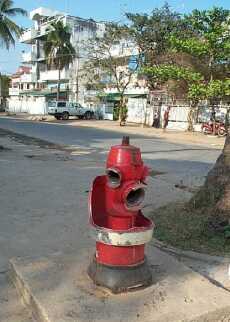 Yesterday I was returning home for my weekly class in liturgical Khmer language--quite different from the common language used on the street--and my motordupe driver pointed out a large column of smoke rising above the buildings ahead of us. As we passed an intersecting street, we could see that some building was on fire. I was pleased to hear a siren responding within five minutes--I didn't know if the fire department here even made house calls!--but was puzzled by the fact that the sirens kept on for the next 45 minutes. Then it occurred to me that they were probably water trucks! There are only a few fire hydrants in the city and I don't know if any of them work. The trucks were making repeated trips to bring water to the firefighters hosing down what turned out to be a burning old traditional wooden house. Later, commenting on the continuing wail of sirens well into our language class, my teacher noted that it was very possible the firefighters were working very slowly, to encourage whoever owned the building to give them some money for motivation to put out the fire more quickly. Yesterday I was returning home for my weekly class in liturgical Khmer language--quite different from the common language used on the street--and my motordupe driver pointed out a large column of smoke rising above the buildings ahead of us. As we passed an intersecting street, we could see that some building was on fire. I was pleased to hear a siren responding within five minutes--I didn't know if the fire department here even made house calls!--but was puzzled by the fact that the sirens kept on for the next 45 minutes. Then it occurred to me that they were probably water trucks! There are only a few fire hydrants in the city and I don't know if any of them work. The trucks were making repeated trips to bring water to the firefighters hosing down what turned out to be a burning old traditional wooden house. Later, commenting on the continuing wail of sirens well into our language class, my teacher noted that it was very possible the firefighters were working very slowly, to encourage whoever owned the building to give them some money for motivation to put out the fire more quickly.
Return to Top of Page
25 July 2001
First Yellow Pages Cambodia has a couple telephone number listings but no official or complete directory of phone numbers. That is about to change, at least for the business listings, as we get our first "Yellow Pages." For the past ten months, 10-15 "data clerks" have been canvassing the businesses of Phnom Penh and Sihanoukville, collecting phone numbers, street addresses, and neighborhood locations. Now the first Yellow Pages with about 13,000 entries from 6,000 businesses is soon to be available. The publisher of this endeavor says that with any luck, there could be a white pages or residential directory within a year or two.
Return to Top of Page
16 July 2001
For some people rain is source of irritation and spoiled plans. For others, it is a source of income, and I'm not talking only about the farmers. Here in Phnom Penh, there is a regular group that meets daily on the roof of a multi-story building to observe the clouds and winds and bet on the rainfall. Rain betting is a popular pasttime in Cambodia's provinces and rural towns, but Phnom Penh has its devotees, too. They bet on three periods of the day, 6:00 AM to noon, noon to 6:00 PM, and 6:00 PM to 6:00 AM. A tin roof over part of the rooftop provides a surface from which the rain drains into a bucket where it is measured to settle any arguments over whether enough rain fell to win the bet or not. Some of the betting crowd are quite accurate in their predictions and can stand to win a good amount of money. There is a small bar in the corner of the rooftop, and some of sky-watchers are more kibitzers than gamblers, but they all enjoy the camaraderie. And some take home some money.
Return to Top of Page
18 June 2001
Today a friend came to visit here at the Maryknoll house. As we were talking, he told me that today the agriculture students at the training school where he is director had found six mines in a field they were getting ready for rice planting. Five were anti-personnel mines and one was an anti-vehicle mine. They have to call CMAG, the mine clearance group, to come and dispose of them. Agriculture students here learn a few things they don't teach in US agricultural programs!
Return to Top of Page
29 May 2001
Cambodia is about to get its first intra-city bus service. The Phnom Penh City Shuttle is scheduled to start operations on 1 June in a one-month experiment. The bus service will have two lines, a north-south route along Monivong Boulevard, and a circular route around the major commercial area. The fee will be 800 riel, about 20 cents in US money.
Return to Top of Page
28 April 2001
That Cambodia is a different sort of place is undeniable to anyone who has spent some time here. How different it is from the US in culture was illustrated to me two different times when meetings being held outdoors--in itself a cultural difference--were interrupted by a loud thunk, the sound of a falling mango hitting the ground which caused several people to bolt from the table and run for the mango as if it were wrapped in $20 bills. Mangoes are grown everywhere and are readily available in the markets but they are expensive for people who make less than a dollar a day so a free one is worth running for.
Return to Top of Page
23 April 2001
Nearly 50 Chinese anti-tank mines have been dug up in Phnom Penh across the street from the Royal Palace, in an area being redeveloped as a riverfront park. Construction crews unearthed 18 of them just last Friday. Villagers from the area say that the landmines and a large number of artillery shells were on a dangerously overloaded barge that nearly sank there in 1979 or 1980. Trying to save the barge, soldiers threw the ordnance overboard. No one knows how many mines are there or where they are because the annual floods have changed the riverbank over the years. However, the mines do not have detonators and are not likely to explode.
Return to Top of Page
15 April 2001--Easter Sunday
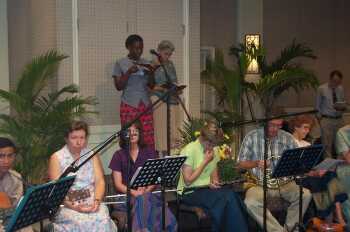 The English-speaking Catholic community celebrated Christ's resurrection at the Easter vigil service last night. Today there was a sunrise service (actually at 7:00 AM) sponsored by the four largest Christian groups in Phnom Penh: the Anglican Church, Assemblies of God, the International Christian Fellowship, and the English-speaking Catholic community. About 475 people filled the ballroom of the Le Royal Hotel for a service of song, scripture, prayer, and a sermon. Maryknoll provided some of the ushers, one of the readers, and I was one of the prayers. It was a nice service that flowed smoothly, and there was a great deal of interest and enthusiasm on the part of all who came. Some people don't like the idea of going to the Le Royal because of the opulent setting, but there are only two venues large enough to hold such a group, and Le Royal is the cheaper of the two. The English-speaking Catholic community celebrated Christ's resurrection at the Easter vigil service last night. Today there was a sunrise service (actually at 7:00 AM) sponsored by the four largest Christian groups in Phnom Penh: the Anglican Church, Assemblies of God, the International Christian Fellowship, and the English-speaking Catholic community. About 475 people filled the ballroom of the Le Royal Hotel for a service of song, scripture, prayer, and a sermon. Maryknoll provided some of the ushers, one of the readers, and I was one of the prayers. It was a nice service that flowed smoothly, and there was a great deal of interest and enthusiasm on the part of all who came. Some people don't like the idea of going to the Le Royal because of the opulent setting, but there are only two venues large enough to hold such a group, and Le Royal is the cheaper of the two.
Return to Top of Page
12 April 2001
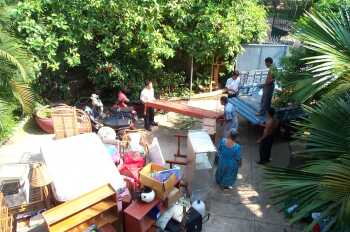 Yesterday was moving day for John Barth and me. John is heading back to work in the United States next week and I can't afford our rent by myself, so I'm moving into the Maryknoll "Big House," our center house here in Phnom Penh. John decided to move with me for his last four or five days in Cambodia. For work like this we hire our regular motordupe drivers who rent a truck for us. It took about 3+ hours to get everything out of our second-floor wooden-house home and moved just about a kilometer over to the three-story concrete Big House. I'm hoping it will be cooler here than in the old house, but my experience so far shows no change! :( A lot of our stuff was given away to other Maryknollers or to the AIDS hospice where some of our people work or to Wat Than so the truck made two more stops after dropping off our belongings. Yesterday was moving day for John Barth and me. John is heading back to work in the United States next week and I can't afford our rent by myself, so I'm moving into the Maryknoll "Big House," our center house here in Phnom Penh. John decided to move with me for his last four or five days in Cambodia. For work like this we hire our regular motordupe drivers who rent a truck for us. It took about 3+ hours to get everything out of our second-floor wooden-house home and moved just about a kilometer over to the three-story concrete Big House. I'm hoping it will be cooler here than in the old house, but my experience so far shows no change! :( A lot of our stuff was given away to other Maryknollers or to the AIDS hospice where some of our people work or to Wat Than so the truck made two more stops after dropping off our belongings.
Return to Top of Page
1-17 April 2001
The Khmer New Year!
Click here
Return to Top of Page
2000
26 March 2000
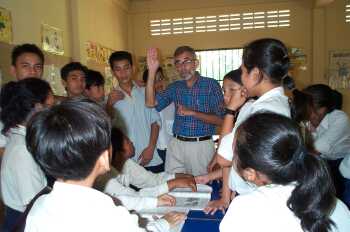 At least once a week I visit the deaf school run by Krousar Thmey (an NGO) here in Phnom Penh. It gives me a chance to meet the kids, understand their level of education, and talk with the teachers. Farther down the road I suspect I will be working with the school in a more formal capacity. Here I am today talking with a group of students during a break. At least once a week I visit the deaf school run by Krousar Thmey (an NGO) here in Phnom Penh. It gives me a chance to meet the kids, understand their level of education, and talk with the teachers. Farther down the road I suspect I will be working with the school in a more formal capacity. Here I am today talking with a group of students during a break.
Return to Top of Page
18 March 2000
 Friday some workers came and erected two tents across the little street next to our house in Phnom Penh, a sure sign that some celebration was to take place. A catering company set up tables and huge cooking vats in the tent at the bottom left of the picture, and Saturday afternoon people started gathering under the right-hand tent for a wedding celebration. Things were relatively muted Saturday night, but Sunday morning at 5:05 AM they started blasting away with traditional Khmer music. By 7:00 AM most of the friends and family had eaten a second large meal under the tent and two stand-up comedians, a man and a woman, starting going through their routine. It was absolutely painful! The noise level was horrendous! Notice the large trumpet speaker just eight feet from our window in the wooden wall at the right (the picture was taken from our second-floor porch), and in primitive cultures, louder is better. All amplification is always literally at full blast. Of course I didn't sleep after 5:05, so I tried doing some work in my room. I thought I'd listen to the BBC news at one point but even with my radio turned up to full volume, I couldn't hear the announcer over the noise coming from the wedding. Finally I gave up and went over to the Maryknoll house to find some relative quiet. It's parts of the culture like that that are hardest for foreigners to live with here. Friday some workers came and erected two tents across the little street next to our house in Phnom Penh, a sure sign that some celebration was to take place. A catering company set up tables and huge cooking vats in the tent at the bottom left of the picture, and Saturday afternoon people started gathering under the right-hand tent for a wedding celebration. Things were relatively muted Saturday night, but Sunday morning at 5:05 AM they started blasting away with traditional Khmer music. By 7:00 AM most of the friends and family had eaten a second large meal under the tent and two stand-up comedians, a man and a woman, starting going through their routine. It was absolutely painful! The noise level was horrendous! Notice the large trumpet speaker just eight feet from our window in the wooden wall at the right (the picture was taken from our second-floor porch), and in primitive cultures, louder is better. All amplification is always literally at full blast. Of course I didn't sleep after 5:05, so I tried doing some work in my room. I thought I'd listen to the BBC news at one point but even with my radio turned up to full volume, I couldn't hear the announcer over the noise coming from the wedding. Finally I gave up and went over to the Maryknoll house to find some relative quiet. It's parts of the culture like that that are hardest for foreigners to live with here.
Return to Top of Page
17 March 2000
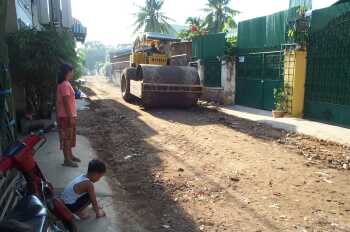 Ever since I moved on to Street 308 about a year ago, the potholes have been getting worse, and particularly at the intersection with a small side street there developed a 12-foot wide hole of muck. The people who lived and cooked their meals beside it kept throwing garbage, tires, palm branches, plastic bags, and anything else handy into it, but it just kept growing and never dried up. To all our amazement Thursday, a road grader and steam roller suddenly appeared on little dirt road Street 308 and leveled it out! They didn't pave it, but at least now a motordupe can travel along the road faster than a person can walk. It was an amazing event. And now it happens just three weeks before I move to another house! Ever since I moved on to Street 308 about a year ago, the potholes have been getting worse, and particularly at the intersection with a small side street there developed a 12-foot wide hole of muck. The people who lived and cooked their meals beside it kept throwing garbage, tires, palm branches, plastic bags, and anything else handy into it, but it just kept growing and never dried up. To all our amazement Thursday, a road grader and steam roller suddenly appeared on little dirt road Street 308 and leveled it out! They didn't pave it, but at least now a motordupe can travel along the road faster than a person can walk. It was an amazing event. And now it happens just three weeks before I move to another house!
Return to Top of Page
3 March 2001
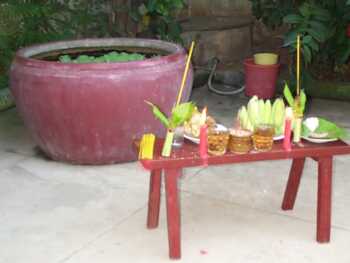 Last week when I came back to the house we rent, there was this bench set up in the yard with offerings on it: a roast chicken, two glasses of tea, some candles, some fruit, some incense, some rice. The landlord's family put it in the corner of the yard but I have no idea what it means or represents or is supposed to do. They weren't around but even if had been, I wouldn't have had the vocabulary to figure out what they were telling me. Last week when I came back to the house we rent, there was this bench set up in the yard with offerings on it: a roast chicken, two glasses of tea, some candles, some fruit, some incense, some rice. The landlord's family put it in the corner of the yard but I have no idea what it means or represents or is supposed to do. They weren't around but even if had been, I wouldn't have had the vocabulary to figure out what they were telling me.
Return to Top of Page
16 February 2000
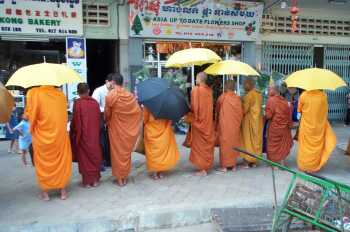 Every day the Buddhist monks of Cambodia leave their temples (wats) at 6:00 AM and start walking the streets of the cities and villages begging for food for the day. They travel alone or in pairs and just stand silently before the front door of a home or business until the resident comes out with an offering of food or money. The monks then return to the wat and eat their meals for the day, not eating anything at all after the noon hour. Several times I have seen lines of 30-50 monks standing in the street before a whole block of businesses. My language school teacher explained that a group of business owners, seeking to gain merit for themselves and probably prosperity for their businesses, will contact a wat and agree to make a major donation. Then at an appointed time, the line of monks will appear and the business people will go to each and put something in his begging bowl. Every day the Buddhist monks of Cambodia leave their temples (wats) at 6:00 AM and start walking the streets of the cities and villages begging for food for the day. They travel alone or in pairs and just stand silently before the front door of a home or business until the resident comes out with an offering of food or money. The monks then return to the wat and eat their meals for the day, not eating anything at all after the noon hour. Several times I have seen lines of 30-50 monks standing in the street before a whole block of businesses. My language school teacher explained that a group of business owners, seeking to gain merit for themselves and probably prosperity for their businesses, will contact a wat and agree to make a major donation. Then at an appointed time, the line of monks will appear and the business people will go to each and put something in his begging bowl.
Return to Top of Page
9 February 2001
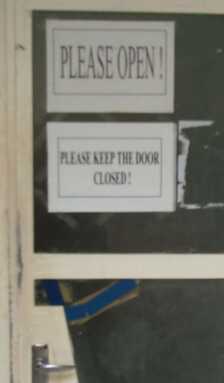 More signs of the times in Cambodia, this time on the door of the Disability Action Council where Rachel Smith, one of our lay missioners, works. More signs of the times in Cambodia, this time on the door of the Disability Action Council where Rachel Smith, one of our lay missioners, works.
Just do what the sign says!
Return to Top of Page
14 January 2001
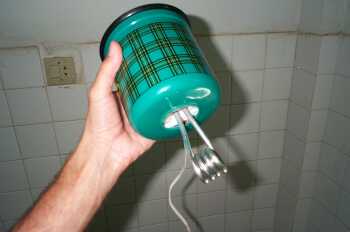 It doesn't get very cold here but that doesn't mean that the showers aren't pretty nippy in the morning since we don't have hot water. After several colleagues bemoaned the cold water, I started tinkering with a little portable water heater that can be immersed in a container to heat water for a shower. One of the fixtures of life in this part of Asia is a toilet paper dispenser, not for the bathroom but for the dining room table, the office desk, the truck dashboard, etc. I adapted one so I could put an immersion heater through the hole, added some styrofoam to make it float, and some rocks to keep it floating vertical, and now I have a prototype. Works pretty well! It doesn't get very cold here but that doesn't mean that the showers aren't pretty nippy in the morning since we don't have hot water. After several colleagues bemoaned the cold water, I started tinkering with a little portable water heater that can be immersed in a container to heat water for a shower. One of the fixtures of life in this part of Asia is a toilet paper dispenser, not for the bathroom but for the dining room table, the office desk, the truck dashboard, etc. I adapted one so I could put an immersion heater through the hole, added some styrofoam to make it float, and some rocks to keep it floating vertical, and now I have a prototype. Works pretty well!
Return to Top of Page
12 January 2001
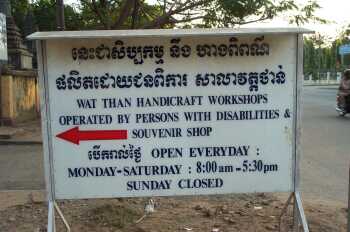 Notice anything a bit peculiar about this sign? (Hint: about when they're open.) Wat Than has four such signs up around its buildings. This skills training workshop is the original Maryknoll project here in Cambodia and is still going strong today. Originally most of the students were young landmine victims but now, thank God, those casualties are decreasing. There are still plenty of people affected by polio, though. Notice anything a bit peculiar about this sign? (Hint: about when they're open.) Wat Than has four such signs up around its buildings. This skills training workshop is the original Maryknoll project here in Cambodia and is still going strong today. Originally most of the students were young landmine victims but now, thank God, those casualties are decreasing. There are still plenty of people affected by polio, though.
Return to Top of Page
21 October 2000--Visit to a Family
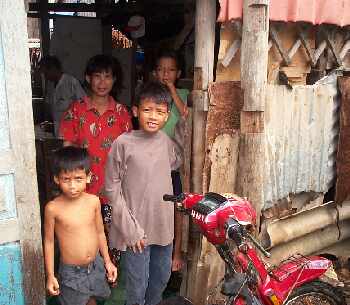 Yesterday my regular motordupe driver asked if I would like to go to his home for lunch, and I jumped at the opportunity. It's easy for foreigners to live totally apart from the local people and never really get to see how they live. Today he picked me up at 11:00 AM and drove me through a maze of five-foot wide "streets" to the little wooden house they call home. My driver, I found out, is one of thirteen children! He is about in the middle. His father also drives a moto and I used to ride with him regularly. They were a delightful bunch to meet and they very warmly accepted me and were glad to have me. I found out that an 11-year old son (in the green shirt above) is deaf and not going to school, so I talked to his parents about getting him into Krousar Thmey, the deaf school where I will be helping out soon. Yesterday my regular motordupe driver asked if I would like to go to his home for lunch, and I jumped at the opportunity. It's easy for foreigners to live totally apart from the local people and never really get to see how they live. Today he picked me up at 11:00 AM and drove me through a maze of five-foot wide "streets" to the little wooden house they call home. My driver, I found out, is one of thirteen children! He is about in the middle. His father also drives a moto and I used to ride with him regularly. They were a delightful bunch to meet and they very warmly accepted me and were glad to have me. I found out that an 11-year old son (in the green shirt above) is deaf and not going to school, so I talked to his parents about getting him into Krousar Thmey, the deaf school where I will be helping out soon.
Return to Top of Page
16 October 2000--Life is Different Here
[1] This morning I was on the back of my usual motordupe heading to language school when the driver pulled over, got off, and looked at his back tire which was rapidly deflating. He would have to get it repaired at one of the little sidewalk repairs shops set up every 500 feet or so, but he told me he had no money. He said it would cost 2000 riel (50 cents) so I gave it to him and hopped on another dupe to get to class. The regular guy was back at the end of school to pick me up but when we got to my house he told me that he had had to buy a new tube and the whole repair had cost him $2.00. Again he had no money so I gave him that, too. Last week he ran out of gas on the way to school and I had to give him 2500 riel for that. Can you imagine being a motordupe driver and making so little money that you can't afford enough gasoline to keep your bike going?
[2] At lunch today I went to get THE knife (we only own one table knife at our house) to make my usual peanut-butter-and-jelly sandwich but it was gone. I had to go out on to the porch outside to get the dishes our housekeeper had washed after breakfast. For her the #1 value is getting the dishes out in the sun. It's not my primary value because outside exposed to the sun they're also exposed to all the dirt in the air, of which we have plenty. There's no arguing with the traditional ways in a culture like this, though.
Return to Top of Page
3 October 2000--Water: Too Much or Too Little
While much of Cambodia is suffering from the worst flooding in 70 years (see map), other parts of Cambodia are suffering from drought, sometimes just 20-25 miles from the flooded areas. Most of the flooding this year has been caused by excessive rains in China, Laos, and northern parts of Cambodia, but other areas of the Khmer kingdom are suffering from a lack of the seasonal rains, with only one month of the rainy season left. Whether because of too much water or too little water, the future looks bleak for many of Cambodia's farmers who have lost at least one of this year's rice crops. In the drought areas, the lack of food is compounded by an increase in disease because most of the rural areas get drinking water from small surface ponds, not from underground wells, and as the ponds dry up, the remaining ponds are used for everything--washing clothes, bathing, drinking and cooking, and watering the animals--encouraging the spread of water-borne diseases.
Return to Top of Page
2 October 2000--Cambodia and the Olympics
Four Cambodians competed in the just-finished Sydney Olympics, but you won't find their names on any of the medal lists and there won't be any sponsoring companies chasing after them. Cambodia sent two swimmers and two sprinters to the games, but they barely had a place to train much less a chance for a medal. The father of the brother and sister swimmers had been a national team swimming coach before the Pol Pot era. Coming back after the defeat of the Khmer Rouge, he found a couple empty rooms at the national stadium and moved his family in there and started training the two Sydney competitors from the age of seven. Three others of his children died under the Khmer Rouge.
But recently the Phnom Penh stadium was closed for renovations so the brother and sister have had to train in a hotel swimming pool which is shorter than Olympic size and not deep enough for swimming turns. And sponsorships? The swimmers have to pay a dollar a day to use the hotel pool--in a country where salaries average $20 a month. At least one of the sprinters got two pairs of running shoes and a track suit from the government before departing for Australia.
Swimmer Hem Raksmey finished 70th of 74 in her swimming heats. Her brother was 66th out of 75. Sprinter Ouk Chan Than finished dead last in the 100-meter heats. But despite no place to train, no sponsorships, none of the special food supplements, no scientific training regimes, they are all already looking forward to competing in Athens four years from now.
Return to Top of Page
1 October 2000--Moving Day
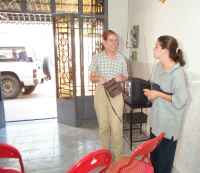 After finishing language school, Cori Petro and Rachel Smith determined what ministries they would be working in, and then turned their attention to finding a place to live other than the Big House (the Maryknoll Center House). If there are just one or two people in the Big House, it's OK, but when there are more than that there is a lot of noise and little privacy because all the sleeping rooms open off the main room which is meeting room, living room, and TV room. Here Cori and Rachel are in their new living room where they moved today. For more pictures, click here. After finishing language school, Cori Petro and Rachel Smith determined what ministries they would be working in, and then turned their attention to finding a place to live other than the Big House (the Maryknoll Center House). If there are just one or two people in the Big House, it's OK, but when there are more than that there is a lot of noise and little privacy because all the sleeping rooms open off the main room which is meeting room, living room, and TV room. Here Cori and Rachel are in their new living room where they moved today. For more pictures, click here.
Return to Top of Page
27 September 2000--Making a Living from Garbage
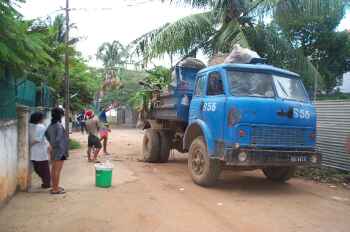 One of the aspects of life in Phnom Penh that surprised me most was to see the garbage trucks coming around several times a week, maybe even every day. Not much works in Phnom Penh, but the garbage collection system does. I found out that maybe it works because there's money in it. A good portion of the residents of Phnom Penh make their living by picking through garbage and recycling scraps of everything. I heard that the garbage collectors are not paid by the city. THEY pay the city for the privilege of collecting the garbage and being able to get all the good stuff right at the source! One of the aspects of life in Phnom Penh that surprised me most was to see the garbage trucks coming around several times a week, maybe even every day. Not much works in Phnom Penh, but the garbage collection system does. I found out that maybe it works because there's money in it. A good portion of the residents of Phnom Penh make their living by picking through garbage and recycling scraps of everything. I heard that the garbage collectors are not paid by the city. THEY pay the city for the privilege of collecting the garbage and being able to get all the good stuff right at the source!
Return to Top of Page
11 September 2000--Merry Christmas!
This evening after a meeting, one of the others leaving the meeting wanted to try out a Lucky Burger, Phnom Penh's answer to McDonald's. I hadn't eaten supper yet so I went with him and got just a hot dog and a Coke because I wasn't very hungry. While my friend was going through his chicken sandwich and french fries, the music suddenly came on, blasting a rock version of Christmas carols at us! I think I was the only one in the whole restaurant that noticed since all the others were probably Asians for whom Christmas is basically a non-event. As we were going out, I noticed on a Lucky Burger bulletin board a "Season's Greetings" Christmas decoration either left over from last year or giving plenty of advance notice that Christmas will indeed come again this year.
Return to Top of Page
7 September 2000--Flood Stage
The annual floods, the dteuk lik, have arrived earlier than usual this year in Cambodia, amplified by excessively heavy rains in China and Tibet which have progressively flooded down the Mekong River to Cambodia. Flood stage was reached in Phnom Penh yesterday, and 40,000 sandbags have been prepared for use if the flood crest continues to rise which is expected. Announcements have been made that a siren will sound from Wat Phnom, the main temple in Phnom Penh, to call for volunteers to start sandbagging the river when a critical level has been reached. Villagers outside the city have already experienced severe flooding and nearly twenty deaths have been reported.
Return to Top of Page
28 August 2000--Corrupt Police
I had my first encounter with the local police on Saturday. I had ridden my bicycle over to the New Market to buy an immersion heater and a pair of pliers, and on the way back I was riding down Norodom Boulevard like I have done many times in the six months since I've been here. Two of the traffic police, who always stand on the sidewalk looking for someone they can shakedown, waved me over and told me bikes and motordupes are not allowed on Norodom. I pretended I didn't know any Khmer so he would have to use English, and he knew enough to tell me I would have to pay here or in the office. I said "in the office," suspecting he wouldn't want to go anywhere where they had to do anything officially, and then he said I could just give him some money for cigarettes and Coca-Cola. Then I said again we should go to the office and got out a paper and started writing down the two officers' badge numbers. At that point I suspected I was being a bit too aggressive so I changed tack and started joking, asking if it was really true that I couldn't bike there, etc. We started laughing about the whole thing and finally I asked if I could just go back the way I came, and he said yes so I took off. Sometimes foreigners are targeted because they are not used to being stopped for inconsequential infractions, and being unfamiliar with the language will just offer money. We were trained, though, that if the police insist on money to go to the station and ask for a receipt. That will often discourage any further action.
Return to Top of Page
24 August 2000--Inscrutable Housekeeper
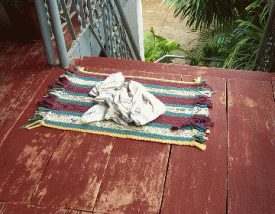 |
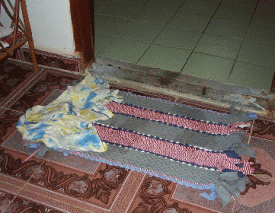 |
| Often part of the difficulty of living and working in a foreign country is not quite knowing what is going on. Sometimes the actions or behavior of local people is not understood--even seems illogical, and compounding the problem is the lack of fluency in the local language which prevents just asking what is happening or what something is for. A case in point: the housekeeper where I live does all sorts of things that I don't understand. One of them is putting a rag on top of the doormats in front of the outside door and the bathroom door. What is the rag for? Are we supposed to step on it and not on the mat? Or should we avoid stepping on the rag itself? Who knows?!
|
Return to Top of Page
23 August 2000--Finally!
 The temperature got down to 80.5° F today! That's the lowest thermometer reading I've seen since I've been here, and it's wonderful. It actually feels cool, and at language school today I saw people wearing jackets and sweaters. It's not THAT cool, but the lowered temperature--due to continuous clouds for a couple days and a lot more rain--is delightful! The temperature got down to 80.5° F today! That's the lowest thermometer reading I've seen since I've been here, and it's wonderful. It actually feels cool, and at language school today I saw people wearing jackets and sweaters. It's not THAT cool, but the lowered temperature--due to continuous clouds for a couple days and a lot more rain--is delightful!
Return to Top of Page
20 August 2000
I got my Cambodian driver's license about two weeks ago (by sending $20 and my Kentucky license to some government ministry with our office manager), and last Friday I ventured out on to Phnom Penh's streets for the first time. I drove our Land Cruiser in the morning rush hour to make sure I got a real test. I asked the office manager to go with me to recommend anything he saw that would help me drive better in Cambodia's largely unregulated--basically chaotic--traffic. It's a real experience to drive here. I'm compiling a Cambodia Driver's Manual that will be posted to the web site soon!
Return to Top of Page
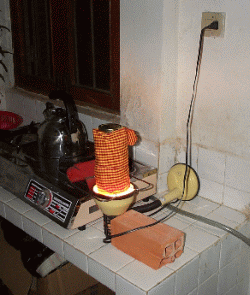 14 August 2000--Cooking in the Missions 14 August 2000--Cooking in the Missions
While I was in the USA during May and June for the MMAF General Assembly, two of our lay missioners, John and Kathy Tucker, moved out of our Maryknoll "Big House" into their own apartment. Kathy was distressed to find that the new kitchen had only a gas ring for cooking, no real stove, so John Barth--the priest I live with--arranged for a trade. Kathy got the real stove, with oven, in our place, and we got their two-burner gas ring. That wasn't much of a problem since John and I don't do much cooking. But then last night I was going to warm up some soup that Kathy had made and given me last week--and found out that when she had got our stove, John B had given her all our pots and pans, too! I was going over to the Big House to borrow a pot but then we had a horrendous rainstorm so I just stayed home and heated up the soup in its glass jar, on top of a 60-watt light bulb in a desk lamp. It took about three hours to get it passably warm!
Return to Top of Page
12 August 2000--New Filing Cabinet
On my last trip back to Phnom Penh from Hong Kong, I brought many files that I felt would be useful here in the years to come. They've been on the floor of my room since early July, but today I bought a new four-drawer filing cabinet to put them in. I had asked around to see if any of the NGOs or offices had an old filing cabinet they would willingly donate but I got no offers so today I put out $85 for a Chinese-made product. I bicycled over to the office furniture store at 1015 and at 1130 I had the filing cabinet in my house. I just looked at the two models on display, told the clerk which one I wanted, gave him my address, and that was it. I didn't sign anything or give any money. Then a delivery man showed up in a small truck and I helped him carry the (heavy!) cabinet up our tricky stairs and then paid him the $85. Our housekeeper came in about that time and she was talking incessantly to the driver. I found out after he left that she was haranguing him for making me help him carry the filing cabinet upstairs. She was telling him that I was too old to be doing that sort of thing. And after he left, she told me the same thing!
Return to Top of Page
5 August 2000
This morning we received an e-mail that one of our members, Sr. Joyce Quinn, died today at Maryknoll, NY at 0615 Cambodian time. She had been suffering from gall bladder cancer. She had been in Cambodia since 1993 and was well known here. She worked with Sr. Regina in a village health project. Good lady!
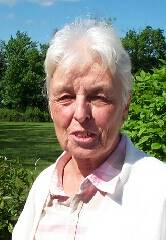 Joyce Quinn
1934-2000 |
Return to Top of Page
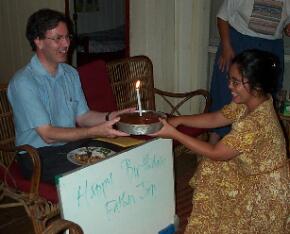 3 August 2000--Maintaining the Fun Quotient 3 August 2000--Maintaining the Fun Quotient
One of the things most westerners miss here is real baked goods--cakes and pies and cookies like you would find in the US or in Europe. (One of the NGOs helping to redirect prostitutes has opened up a bakery shop here that serves wonderful cakes and pies!) We Maryknollers are no exception, and we take every opportunity to celebrate our birthdays with cakes from the Jars of Clay bakery when we gather for our Wednesday NGO meetings, liturgy, and dinner. This week we had a real birthday to celebrate but Jim was in the US. That didn't stop us, though, and we had our newest partner, Frans Lion, an eye doctor from the Netherlands, substitute for Jim and receive our well wishes and birthday song in his stead.
2 August 2000--Corruption in Cambodia Official Passports
The Cambodian Minister of Foreign Affairs confirmed before a parliamentary investigating body that the government has issued diplomatic passports to non-diplomats. More than 4,000 diplomatic passports have been issued while the number of eligible officials is close to 400 persons. Thailand, a much larger country, has issued only 1,000 diplomatic documents. The special passports are sought after by businessmen for unhindered travel and probably by minor officials as a status symbol.
Return to Top of Page
1 August 2000
The annual floods came a few weeks early this year, but the early peak has already passed and the flood waters have receded a bit. The low-lying areas will stay flooded for the next 2-3 months, however. I learned in my Khmer classes that the people here have three words for flood, all used with the word dteuk which means "water":
- dteuk lik means the sudden minor flooding that occurs because of any especially heavy thunderstorm or some other similar natural event;
- dteuk jooun means the annual floods that come this time every year and are part of the life cycle here. People expect them and just move their pigs and dogs and chickens up into the house from underneath until the worst of the flooding passes, usually one to two weeks;
- dteuk joom noon means an unexpected, violent, and destructive flood.
Return to Top of Page
Intruders at Maryknoll--24 July 2000
About 4:30 this morning, four people climbed a tree to get over the wall into the yard of the Maryknoll center house and office. Our guard was on duty and raised the alarm and the guards from nearby houses came to help. They caught one of the intruders who were apparently trying to steal a bicycle. The captured would-be thief was just a young boy who started crying--with good reason since at least once a week thieves are beaten to death in the streets by crowds because they know the police won't do anything to arrest and convict criminals. Our guard didn't turn the boy over to the police--who would have just charged money from his family to have him released--but instead took him home. Our two newest lay missioners, both young women in their early 20s, were a bit shaken up by the incident but were just grateful that our most experienced lay missioner, a man, was also there in the house with them.
Return to Top of Page
Remnants of a Secret War--12 July 2000
Recently six American 500-lb bombs were detonated at the Cambodian Mine Action Center's demolition site. The bombs, dropped from a B-52 in 1975, landed unexploded near Dechor Island, halfway along Highway One to Vietnam. They were the largest group of unexploded ordnance so far recovered by CMAC. A fisherman discovered them in the Mekong River. Demolition experts speculated that these six bombs were jettisoned in the relatively isolated spot by a bomber crew returning to base, and the bombs didn't explode because they were dropped too low and their fuses didn't have time to arm themselves. Between 1970 and 1975 the Americans dropped more than two million tons of bombs on Cambodia in a secret war carried on without congressional approval. 43,415 air attacks took place within Cambodia, and some scholars cite the devastation they caused as a reason for the rise of the Khmer Rouge and their ability to attract the support of the peasants.
Return to Top of Page
My New Window--9 July 2000
 Fr. John Barth and I live in an old, traditional-style Khmer house in a relatively quiet neighborhood. My room had only one small window so we asked the landlord to put a larger one in. He and a friend did all the carpentry work, mainly with two axes with homemade handles, two crowbars, and one saw. The window was installed on Wednesday and Thursday--while in the meanwhile I had all my stuff out in the main living area--and then yesterday the landlord added a cornice over the window for hanging a curtain. I took this picture this afternoon, and then later in the day the housekeeper brought in some curtains she had made. Fr. John Barth and I live in an old, traditional-style Khmer house in a relatively quiet neighborhood. My room had only one small window so we asked the landlord to put a larger one in. He and a friend did all the carpentry work, mainly with two axes with homemade handles, two crowbars, and one saw. The window was installed on Wednesday and Thursday--while in the meanwhile I had all my stuff out in the main living area--and then yesterday the landlord added a cornice over the window for hanging a curtain. I took this picture this afternoon, and then later in the day the housekeeper brought in some curtains she had made.
Return to Top of Page
Crime in Cambodia--8 July 2000
One of the more popular backpacker tourbooks describes Cambodia as "basically lawless," but there are hopeful signs. Statistics recently released indicated that the violent-crime rate dropped significantly last year as the result of several crackdowns aimed at increasing security within the country. Homicides were down 26% to 581; armed robberies in Phnom Penh dropped 23 percent to 1,396 for the year; and kidnappings were down 30% to 27 during the past twelve months. Prime Minister Hun Sen's government also launched a firearms buy-back program that netted 65,000 weapons and nearly 600 grenades; and it also closed 67 gambling house in the capital in addition to some high-profile anti-drug operations.
Return to Top of Page
Morning Prayers--19 February 2000 Saturday was the full moon, and at 6:00 AM the head monk of the local Buddhist wat (temple) got on the PA system and broadcast a spiritual message to the neighborhood. I hope the neighbors appreciated it; I didn't especially. First, I couldn't understand what he was saying, and, second, it was 6:00 AM! Everybody gets up early here, but that's too early to be blasting the neighborhood. Or maybe I just think it's too early and everyone else except me was already up?! :) (Actually, I do get up at 6:00 AM on school days, but don't have classes on Saturday.) John, the priest I live with, says that I can expect to hear a message like that every fourteen days.
Supply and Demand--16 March 2000
I bought a new HP810C color printer today here in Phnom Penh. There's not a lot of bargaining room on name brand imported products like that, but I did get the price down to $205. My friend in the US told me he has seen the same printer in Office Depot for $150--and on sale for $130. And when I was in Bangkok on Tuesday, I saw it there for $170.
I could easily have bought it in Bangkok because I didn't have any other stuff to carry, but we try to buy everything we can in Cambodia, even if it costs more, because what this country needs is to build up its economy so that the government has a tax base for all the infrastructure projects that are so desperately needed. Cambodia also needs to develop a middle class which is one of the major factors in moving a country out of poverty and toward a more liberal and flexible political system. When a strong middle class develops and starts complaining about useless government restrictions, bureaucracy, and inefficiency and corruption, then the government has to listen because the middle class will have economic clout.
I don't drink many soft drinks but now I've stopped drinking Coca-Cola in Cambodia for the same reason--I don't want any money going out of Cambodia to Coke headquarters in Atlanta. I just order a lemon juice and every cent supports farmers and merchants here.
Wedding Season--18 March 2000
 In the past day or so, I have seen about ten wedding parties around Phnom Penh, either couples and their entourages in a white car decorated with red ribbons and bows, or the tents set up in the city streets for a wedding celebration and reception. A couple days ago, I could barely get into the courtyard of the house where I live because a neighbor's wedding tent completely covered the whole street right up to our gate. Anyone wanting to use the street was out of luck. The advent of the rainy season is the reason everyone wants to get married now. They want to have a dry day to celebrate. Like the Chinese tradition, red seems to be the color for celebration and happiness here. In the picture above, note the bunches of bananas painted gold and silver on either side of the entranceway. In the past day or so, I have seen about ten wedding parties around Phnom Penh, either couples and their entourages in a white car decorated with red ribbons and bows, or the tents set up in the city streets for a wedding celebration and reception. A couple days ago, I could barely get into the courtyard of the house where I live because a neighbor's wedding tent completely covered the whole street right up to our gate. Anyone wanting to use the street was out of luck. The advent of the rainy season is the reason everyone wants to get married now. They want to have a dry day to celebrate. Like the Chinese tradition, red seems to be the color for celebration and happiness here. In the picture above, note the bunches of bananas painted gold and silver on either side of the entranceway.
Ex-Pat Cowboys--20 March 2000
The main mode of transportation here in Phnom Penh is what are called "motordupes," small motorbikes with drivers who cruise around the streets all day looking for paying passenger. The standard rate is 500 riels (about 13 cents) per kilometer, and even that is expensive for the local people.
Not content to live and travel like the local people, a lot of the young ex-pat males here adopt a cowboy lifestyle. Probably away from home for the first time, with plenty of money in a foreign country where the average policeman makes $25 a month, these cowboys tend to be very ostentatious. They don't drive motorbikes but BIG motorcycles, usually dirt bikes with fenders about four feet off the ground. And no mufflers. They love to roar around and let everyone know what they've got. And throw loud noisy parties for their ex-pat friends. It's probably not terminal and they'll eventually grow up, but sometimes it makes you want to barf.
Happenings--23 March 2000
• Yesterday one of the ferry boats, like the one we took to Siem Reap less than two weeks ago, was hijacked. I don't have the full story but about an hour into the five-hour trip, some armed men who had boarded as passengers took over the boat, forced it to stop, and then tied up and robbed all the passengers. Not a happy event for the tourist industry here!
• Tonight I had dinner with an official of the UN Human Rights Commission here in Cambodia and an activist who works for one of the major human rights legal groups here. Very interesting conversation! It was revealing to hear the stories behind the scenes here.
Death in Cambodia--27 March 2000
The young man who works as a guard at the house where I live took off excitedly for his wife's village four days ago when he got the news that she had gone into labor. Both of them are about 20 years old and this was their first child. They live in Phnom Penh, but the wife wanted to give birth in the village where her parents live. Tonight the young man came back to tell us the baby had died. There were some complications and with only a traditional midwife or less in attendance they could not save the baby. The young man told us that then they had taken the wife to Vietnam for treatment because the health care system is better there. What is so sad is that probably the mother had no prenatal care at all although Maryknoll pays for medical care for all its employees and their families--and even school for their kids. Most of the people don't really understand contracts and benefits, though, even when they are translated and explained repeatedly, and there is also a cultural obstacle to overcome in that no one here wants to waste money going to a doctor when they feel good but only when they are dying--which is what happened in this case. We're just hoping the wife was in good enough shape to survive the two- or three-hour trip to the nearest Vietnamese medical facilities. The priest I live with was really upset because no one had told him in advance the wife had gone to the village where there was no possibility of medical assistance, and we have a Red Cross maternity facility--supported by the Japanese--just around the corner from us. It's one of the best maternity hospitals in the country and probably would have cost $40 to have the baby there. But now because people in poverty don't know about proper care, are afraid to ask for it, and reluctant to use it, the baby is dead and the wife is in trouble. The young husband borrowed $150 before leaving again to go to his wife in Vietnam, bribe the border officials to get in, and to pay for the care she receives. Say a prayer she survives.
Ex-pats in Cambodia--31 March 2000
Many ex-patriates who live in foreign countries never really know what that country is like because they live in embassy compounds or enclaves surrounded by high-walls and only allowing westerners to live inside. I've seen foreigners talking about their experiences in various countries and I know they have only seen close-up the inside of the embassy, their foreigners club, and their compound where they live. Anything beyond that was glimpsed through the tinted glass of their air-conditioned cars as they journeyed around town, avoiding the "bad" areas. This is one of the poorest countries of Asia, even of the world, and yet a person can live almost like in the US or Europe if she or he wants to. The average police salary here is about $25 a month but today's Cambodia Daily carries an add for the Bliss salon, offering "Free Eyelash Tint with Waxing." I don't think any of my neighbors will be going.
Return to Top of Page
Cambodians Like Dollars--2 April 2000
 In the last twenty years or so of Cambodian history, through the ravages of the Pol Pot regime, the reconstruction period, then the 1997 coup and the flight of the NGOs and most business, the national currency, the riel, has steadily declined. The US dollar became a steady currency trusted by all, and now the dollar is used almost as much as the riel. For small purchases, like a liter of gasoline for a motordupe, riel are used, but for almost everything else the price is quoted in either US dollars or sometimes dollars and riel. Last week I bought a set of wrenches in a neighborhood market and the price was given in dollars. Today I bought bread in a western-oriented supermarket, and the prices were all in dollars. US coins are not in circulation, though, so all change is made in riel. So today the cost of my purchases was $2.20, I gave the cashier US$3.00, and she gave me 3100 riel for the 80 cents change. In the last twenty years or so of Cambodian history, through the ravages of the Pol Pot regime, the reconstruction period, then the 1997 coup and the flight of the NGOs and most business, the national currency, the riel, has steadily declined. The US dollar became a steady currency trusted by all, and now the dollar is used almost as much as the riel. For small purchases, like a liter of gasoline for a motordupe, riel are used, but for almost everything else the price is quoted in either US dollars or sometimes dollars and riel. Last week I bought a set of wrenches in a neighborhood market and the price was given in dollars. Today I bought bread in a western-oriented supermarket, and the prices were all in dollars. US coins are not in circulation, though, so all change is made in riel. So today the cost of my purchases was $2.20, I gave the cashier US$3.00, and she gave me 3100 riel for the 80 cents change.
Return to Top of Page
Infant Mortality--4 April 2000
The government released figures this week showing that Cambodia has the highest infant mortality of all of Southeast Asia, approximately 115 children out of every 1000 dying before they are five years old. That is almost 12% of all children, and this figure is double the average of the region. The most common causes of infant death in Cambodia are malnutrition and diarrhea caused by dirty drinking water. One half of the children in the country are said to be malnourished.
Return to Top of Page
Cooking on the Floor--5 April 2000
 The Maryknoll center house in Phnom Penh is one of the old wooden houses built up on stilts. It has six bedrooms, a large living room, a small dining room, and a large kitchen. As seen here, though, our two cooks prefer to prepare the food seated on the floor, lots of counter space and several tables in the kitchen notwithstanding. At least everyone leaves shoes and sandals on the porch and the two cooks keep the floor clean! The Maryknoll center house in Phnom Penh is one of the old wooden houses built up on stilts. It has six bedrooms, a large living room, a small dining room, and a large kitchen. As seen here, though, our two cooks prefer to prepare the food seated on the floor, lots of counter space and several tables in the kitchen notwithstanding. At least everyone leaves shoes and sandals on the porch and the two cooks keep the floor clean!
Return to Top of Page
Cambodian Haircut--9 April 2000
 It was time for a haircut so I started looking for a barber when I went to the nearby market, a series of covered sheds with narrow paths between them. Inside were maybe 15 shops for women's hair but nothing for men. I had passed several little "shops" out on the street so I got back on my bike and started riding till I found one man with no customers and got my first Cambodian haircut. His "shop" is a chair set in the dirt next to a wall, with a rock for the customer's feet. I said "short" and that's exactly what he cut it! Cost me all of $0.72! It was time for a haircut so I started looking for a barber when I went to the nearby market, a series of covered sheds with narrow paths between them. Inside were maybe 15 shops for women's hair but nothing for men. I had passed several little "shops" out on the street so I got back on my bike and started riding till I found one man with no customers and got my first Cambodian haircut. His "shop" is a chair set in the dirt next to a wall, with a rock for the customer's feet. I said "short" and that's exactly what he cut it! Cost me all of $0.72!
As soon as I got the haircut, I went home and took a shower to get rid of any lice that might be passed by the barber's tools. Many men don't like to use the street barbers because they use a piece of old razor blade for trimming (they're afraid of AIDS) but my guy opened up a new razor blade. (That's my black bike and helmet on the right.)
Early Rains--26 April 2000
It has rained almost every afternoon for the past two weeks, marking an early beginning to the wet season. It has kept temperatures from rising quite as high in the afternoons, but it has been somewhat disastrous for the rice farmers in the south. They usually plant two crops, the main crop in the wet season and a smaller crop in the dry season. Now is harvest time for the winter-time dry crop, but the early rains have caught the rice in the fields and thousands of acres have been lost because it was wet when cut and then became moldy. The loss of most of their crop has seriously hurt farmers who depend on that food and income to tide them over until the main crop can be harvested later this year when the rains stop.
Return to Top of Page
Embassy Warning--28 April 2000
Yesterday the U.S. Embassy in Phnom Penh faxed to all the Americans on its security alert list to warn us of demonstrations expected on 30 April and 1 May. The warning advised all Americans to stay away from all demonstrations, political or otherwise, and away from military installations; and to remain indoors after dark and return home early if you should be out in the evening. We're curious what is behind this warning since 1 May, Labor Day, is an international holiday and has nothing specifically to do with the United States, and there is no strong anti-American sentiment going around Cambodia now. And one of our members who advises the Cambodia Labor Organization is part of the planning for a 2000+ demonstration on this coming Monday, Labor Day.
Return to Top of Page
Readjustment Period--29 June 2000
Arriving back in Cambodia after seven weeks in the US and Hong Kong has required a bit of an adjustment period, to again get used to the way things are done here. When making my peanut butter and jelly sandwich in Hong Kong, I would open the jelly, open the peanut butter, open the bread, and then walk in the other room to get the newspaper or something. I have to keep reminding myself not to do that here because after just a minute away, the ants and geckos are in attack position on anything left open!
Return to Top of Page
|


 The temperature got down to 80.5° F today! That's the lowest thermometer reading I've seen since I've been here, and it's wonderful. It actually feels cool, and at language school today I saw people wearing jackets and sweaters. It's not THAT cool, but the lowered temperature--due to continuous clouds for a couple days and a lot more rain--is delightful!
The temperature got down to 80.5° F today! That's the lowest thermometer reading I've seen since I've been here, and it's wonderful. It actually feels cool, and at language school today I saw people wearing jackets and sweaters. It's not THAT cool, but the lowered temperature--due to continuous clouds for a couple days and a lot more rain--is delightful!
 14 August 2000--Cooking in the Missions
14 August 2000--Cooking in the Missions
 3 August 2000--Maintaining the Fun Quotient
3 August 2000--Maintaining the Fun Quotient Fr. John Barth and I live in an old, traditional-style Khmer house in a relatively quiet neighborhood. My room had only one small window so we asked the landlord to put a larger one in. He and a friend did all the carpentry work, mainly with two axes with homemade handles, two crowbars, and one saw. The window was installed on Wednesday and Thursday--while in the meanwhile I had all my stuff out in the main living area--and then yesterday the landlord added a cornice over the window for hanging a curtain. I took this picture this afternoon, and then later in the day the housekeeper brought in some curtains she had made.
Fr. John Barth and I live in an old, traditional-style Khmer house in a relatively quiet neighborhood. My room had only one small window so we asked the landlord to put a larger one in. He and a friend did all the carpentry work, mainly with two axes with homemade handles, two crowbars, and one saw. The window was installed on Wednesday and Thursday--while in the meanwhile I had all my stuff out in the main living area--and then yesterday the landlord added a cornice over the window for hanging a curtain. I took this picture this afternoon, and then later in the day the housekeeper brought in some curtains she had made.
 In the past day or so, I have seen about ten wedding parties around Phnom Penh, either couples and their entourages in a white car decorated with red ribbons and bows, or the tents set up in the city streets for a wedding celebration and reception. A couple days ago, I could barely get into the courtyard of the house where I live because a neighbor's wedding tent completely covered the whole street right up to our gate. Anyone wanting to use the street was out of luck. The advent of the rainy season is the reason everyone wants to get married now. They want to have a dry day to celebrate. Like the Chinese tradition, red seems to be the color for celebration and happiness here. In the picture above, note the bunches of bananas painted gold and silver on either side of the entranceway.
In the past day or so, I have seen about ten wedding parties around Phnom Penh, either couples and their entourages in a white car decorated with red ribbons and bows, or the tents set up in the city streets for a wedding celebration and reception. A couple days ago, I could barely get into the courtyard of the house where I live because a neighbor's wedding tent completely covered the whole street right up to our gate. Anyone wanting to use the street was out of luck. The advent of the rainy season is the reason everyone wants to get married now. They want to have a dry day to celebrate. Like the Chinese tradition, red seems to be the color for celebration and happiness here. In the picture above, note the bunches of bananas painted gold and silver on either side of the entranceway.
 In the last twenty years or so of Cambodian history, through the ravages of the Pol Pot regime, the reconstruction period, then the 1997 coup and the flight of the NGOs and most business, the national currency, the riel, has steadily declined. The US dollar became a steady currency trusted by all, and now the dollar is used almost as much as the riel. For small purchases, like a liter of gasoline for a motordupe, riel are used, but for almost everything else the price is quoted in either US dollars or sometimes dollars and riel. Last week I bought a set of wrenches in a neighborhood market and the price was given in dollars. Today I bought bread in a western-oriented supermarket, and the prices were all in dollars. US coins are not in circulation, though, so all change is made in riel. So today the cost of my purchases was $2.20, I gave the cashier US$3.00, and she gave me 3100 riel for the 80 cents change.
In the last twenty years or so of Cambodian history, through the ravages of the Pol Pot regime, the reconstruction period, then the 1997 coup and the flight of the NGOs and most business, the national currency, the riel, has steadily declined. The US dollar became a steady currency trusted by all, and now the dollar is used almost as much as the riel. For small purchases, like a liter of gasoline for a motordupe, riel are used, but for almost everything else the price is quoted in either US dollars or sometimes dollars and riel. Last week I bought a set of wrenches in a neighborhood market and the price was given in dollars. Today I bought bread in a western-oriented supermarket, and the prices were all in dollars. US coins are not in circulation, though, so all change is made in riel. So today the cost of my purchases was $2.20, I gave the cashier US$3.00, and she gave me 3100 riel for the 80 cents change.
 The Maryknoll center house in Phnom Penh is one of the old wooden houses built up on stilts. It has six bedrooms, a large living room, a small dining room, and a large kitchen. As seen here, though, our two cooks prefer to prepare the food seated on the floor, lots of counter space and several tables in the kitchen notwithstanding. At least everyone leaves shoes and sandals on the porch and the two cooks keep the floor clean!
The Maryknoll center house in Phnom Penh is one of the old wooden houses built up on stilts. It has six bedrooms, a large living room, a small dining room, and a large kitchen. As seen here, though, our two cooks prefer to prepare the food seated on the floor, lots of counter space and several tables in the kitchen notwithstanding. At least everyone leaves shoes and sandals on the porch and the two cooks keep the floor clean!
 It was time for a haircut so I started looking for a barber when I went to the nearby market, a series of covered sheds with narrow paths between them. Inside were maybe 15 shops for women's hair but nothing for men. I had passed several little "shops" out on the street so I got back on my bike and started riding till I found one man with no customers and got my first Cambodian haircut. His "shop" is a chair set in the dirt next to a wall, with a rock for the customer's feet. I said "short" and that's exactly what he cut it! Cost me all of $0.72!
It was time for a haircut so I started looking for a barber when I went to the nearby market, a series of covered sheds with narrow paths between them. Inside were maybe 15 shops for women's hair but nothing for men. I had passed several little "shops" out on the street so I got back on my bike and started riding till I found one man with no customers and got my first Cambodian haircut. His "shop" is a chair set in the dirt next to a wall, with a rock for the customer's feet. I said "short" and that's exactly what he cut it! Cost me all of $0.72!  Yesterday I was returning home for my weekly class in liturgical Khmer language--quite different from the common language used on the street--and my motordupe driver pointed out a large column of smoke rising above the buildings ahead of us. As we passed an intersecting street, we could see that some building was on fire. I was pleased to hear a siren responding within five minutes--I didn't know if the fire department here even made house calls!--but was puzzled by the fact that the sirens kept on for the next 45 minutes. Then it occurred to me that they were probably water trucks! There are only a few fire hydrants in the city and I don't know if any of them work. The trucks were making repeated trips to bring water to the firefighters hosing down what turned out to be a burning old traditional wooden house. Later, commenting on the continuing wail of sirens well into our language class, my teacher noted that it was very possible the firefighters were working very slowly, to encourage whoever owned the building to give them some money for motivation to put out the fire more quickly.
Yesterday I was returning home for my weekly class in liturgical Khmer language--quite different from the common language used on the street--and my motordupe driver pointed out a large column of smoke rising above the buildings ahead of us. As we passed an intersecting street, we could see that some building was on fire. I was pleased to hear a siren responding within five minutes--I didn't know if the fire department here even made house calls!--but was puzzled by the fact that the sirens kept on for the next 45 minutes. Then it occurred to me that they were probably water trucks! There are only a few fire hydrants in the city and I don't know if any of them work. The trucks were making repeated trips to bring water to the firefighters hosing down what turned out to be a burning old traditional wooden house. Later, commenting on the continuing wail of sirens well into our language class, my teacher noted that it was very possible the firefighters were working very slowly, to encourage whoever owned the building to give them some money for motivation to put out the fire more quickly.
 The English-speaking Catholic community celebrated Christ's resurrection at the Easter vigil service last night. Today there was a sunrise service (actually at 7:00 AM) sponsored by the four largest Christian groups in Phnom Penh: the Anglican Church, Assemblies of God, the International Christian Fellowship, and the English-speaking Catholic community. About 475 people filled the ballroom of the Le Royal Hotel for a service of song, scripture, prayer, and a sermon. Maryknoll provided some of the ushers, one of the readers, and I was one of the prayers. It was a nice service that flowed smoothly, and there was a great deal of interest and enthusiasm on the part of all who came. Some people don't like the idea of going to the Le Royal because of the opulent setting, but there are only two venues large enough to hold such a group, and Le Royal is the cheaper of the two.
The English-speaking Catholic community celebrated Christ's resurrection at the Easter vigil service last night. Today there was a sunrise service (actually at 7:00 AM) sponsored by the four largest Christian groups in Phnom Penh: the Anglican Church, Assemblies of God, the International Christian Fellowship, and the English-speaking Catholic community. About 475 people filled the ballroom of the Le Royal Hotel for a service of song, scripture, prayer, and a sermon. Maryknoll provided some of the ushers, one of the readers, and I was one of the prayers. It was a nice service that flowed smoothly, and there was a great deal of interest and enthusiasm on the part of all who came. Some people don't like the idea of going to the Le Royal because of the opulent setting, but there are only two venues large enough to hold such a group, and Le Royal is the cheaper of the two.
 Yesterday was moving day for John Barth and me. John is heading back to work in the United States next week and I can't afford our rent by myself, so I'm moving into the Maryknoll "Big House," our center house here in Phnom Penh. John decided to move with me for his last four or five days in Cambodia. For work like this we hire our regular motordupe drivers who rent a truck for us. It took about 3+ hours to get everything out of our second-floor wooden-house home and moved just about a kilometer over to the three-story concrete Big House. I'm hoping it will be cooler here than in the old house, but my experience so far shows no change! :( A lot of our stuff was given away to other Maryknollers or to the AIDS hospice where some of our people work or to Wat Than so the truck made two more stops after dropping off our belongings.
Yesterday was moving day for John Barth and me. John is heading back to work in the United States next week and I can't afford our rent by myself, so I'm moving into the Maryknoll "Big House," our center house here in Phnom Penh. John decided to move with me for his last four or five days in Cambodia. For work like this we hire our regular motordupe drivers who rent a truck for us. It took about 3+ hours to get everything out of our second-floor wooden-house home and moved just about a kilometer over to the three-story concrete Big House. I'm hoping it will be cooler here than in the old house, but my experience so far shows no change! :( A lot of our stuff was given away to other Maryknollers or to the AIDS hospice where some of our people work or to Wat Than so the truck made two more stops after dropping off our belongings.
 At least once a week I visit the deaf school run by Krousar Thmey (an NGO) here in Phnom Penh. It gives me a chance to meet the kids, understand their level of education, and talk with the teachers. Farther down the road I suspect I will be working with the school in a more formal capacity. Here I am today talking with a group of students during a break.
At least once a week I visit the deaf school run by Krousar Thmey (an NGO) here in Phnom Penh. It gives me a chance to meet the kids, understand their level of education, and talk with the teachers. Farther down the road I suspect I will be working with the school in a more formal capacity. Here I am today talking with a group of students during a break.
 Friday some workers came and erected two tents across the little street next to our house in Phnom Penh, a sure sign that some celebration was to take place. A catering company set up tables and huge cooking vats in the tent at the bottom left of the picture, and Saturday afternoon people started gathering under the right-hand tent for a wedding celebration. Things were relatively muted Saturday night, but Sunday morning at 5:05 AM they started blasting away with traditional Khmer music. By 7:00 AM most of the friends and family had eaten a second large meal under the tent and two stand-up comedians, a man and a woman, starting going through their routine. It was absolutely painful! The noise level was horrendous! Notice the large trumpet speaker just eight feet from our window in the wooden wall at the right (the picture was taken from our second-floor porch), and in primitive cultures, louder is better. All amplification is always literally at full blast. Of course I didn't sleep after 5:05, so I tried doing some work in my room. I thought I'd listen to the BBC news at one point but even with my radio turned up to full volume, I couldn't hear the announcer over the noise coming from the wedding. Finally I gave up and went over to the Maryknoll house to find some relative quiet. It's parts of the culture like that that are hardest for foreigners to live with here.
Friday some workers came and erected two tents across the little street next to our house in Phnom Penh, a sure sign that some celebration was to take place. A catering company set up tables and huge cooking vats in the tent at the bottom left of the picture, and Saturday afternoon people started gathering under the right-hand tent for a wedding celebration. Things were relatively muted Saturday night, but Sunday morning at 5:05 AM they started blasting away with traditional Khmer music. By 7:00 AM most of the friends and family had eaten a second large meal under the tent and two stand-up comedians, a man and a woman, starting going through their routine. It was absolutely painful! The noise level was horrendous! Notice the large trumpet speaker just eight feet from our window in the wooden wall at the right (the picture was taken from our second-floor porch), and in primitive cultures, louder is better. All amplification is always literally at full blast. Of course I didn't sleep after 5:05, so I tried doing some work in my room. I thought I'd listen to the BBC news at one point but even with my radio turned up to full volume, I couldn't hear the announcer over the noise coming from the wedding. Finally I gave up and went over to the Maryknoll house to find some relative quiet. It's parts of the culture like that that are hardest for foreigners to live with here.
 Ever since I moved on to Street 308 about a year ago, the potholes have been getting worse, and particularly at the intersection with a small side street there developed a 12-foot wide hole of muck. The people who lived and cooked their meals beside it kept throwing garbage, tires, palm branches, plastic bags, and anything else handy into it, but it just kept growing and never dried up. To all our amazement Thursday, a road grader and steam roller suddenly appeared on little dirt road Street 308 and leveled it out! They didn't pave it, but at least now a motordupe can travel along the road faster than a person can walk. It was an amazing event. And now it happens just three weeks before I move to another house!
Ever since I moved on to Street 308 about a year ago, the potholes have been getting worse, and particularly at the intersection with a small side street there developed a 12-foot wide hole of muck. The people who lived and cooked their meals beside it kept throwing garbage, tires, palm branches, plastic bags, and anything else handy into it, but it just kept growing and never dried up. To all our amazement Thursday, a road grader and steam roller suddenly appeared on little dirt road Street 308 and leveled it out! They didn't pave it, but at least now a motordupe can travel along the road faster than a person can walk. It was an amazing event. And now it happens just three weeks before I move to another house!
 Last week when I came back to the house we rent, there was this bench set up in the yard with offerings on it: a roast chicken, two glasses of tea, some candles, some fruit, some incense, some rice. The landlord's family put it in the corner of the yard but I have no idea what it means or represents or is supposed to do. They weren't around but even if had been, I wouldn't have had the vocabulary to figure out what they were telling me.
Last week when I came back to the house we rent, there was this bench set up in the yard with offerings on it: a roast chicken, two glasses of tea, some candles, some fruit, some incense, some rice. The landlord's family put it in the corner of the yard but I have no idea what it means or represents or is supposed to do. They weren't around but even if had been, I wouldn't have had the vocabulary to figure out what they were telling me.
 Every day the Buddhist monks of Cambodia leave their temples (wats) at 6:00 AM and start walking the streets of the cities and villages begging for food for the day. They travel alone or in pairs and just stand silently before the front door of a home or business until the resident comes out with an offering of food or money. The monks then return to the wat and eat their meals for the day, not eating anything at all after the noon hour. Several times I have seen lines of 30-50 monks standing in the street before a whole block of businesses. My language school teacher explained that a group of business owners, seeking to gain merit for themselves and probably prosperity for their businesses, will contact a wat and agree to make a major donation. Then at an appointed time, the line of monks will appear and the business people will go to each and put something in his begging bowl.
Every day the Buddhist monks of Cambodia leave their temples (wats) at 6:00 AM and start walking the streets of the cities and villages begging for food for the day. They travel alone or in pairs and just stand silently before the front door of a home or business until the resident comes out with an offering of food or money. The monks then return to the wat and eat their meals for the day, not eating anything at all after the noon hour. Several times I have seen lines of 30-50 monks standing in the street before a whole block of businesses. My language school teacher explained that a group of business owners, seeking to gain merit for themselves and probably prosperity for their businesses, will contact a wat and agree to make a major donation. Then at an appointed time, the line of monks will appear and the business people will go to each and put something in his begging bowl.
 More signs of the times in Cambodia, this time on the door of the Disability Action Council where Rachel Smith, one of our lay missioners, works.
More signs of the times in Cambodia, this time on the door of the Disability Action Council where Rachel Smith, one of our lay missioners, works. It doesn't get very cold here but that doesn't mean that the showers aren't pretty nippy in the morning since we don't have hot water. After several colleagues bemoaned the cold water, I started tinkering with a little portable water heater that can be immersed in a container to heat water for a shower. One of the fixtures of life in this part of Asia is a toilet paper dispenser, not for the bathroom but for the dining room table, the office desk, the truck dashboard, etc. I adapted one so I could put an immersion heater through the hole, added some styrofoam to make it float, and some rocks to keep it floating vertical, and now I have a prototype. Works pretty well!
It doesn't get very cold here but that doesn't mean that the showers aren't pretty nippy in the morning since we don't have hot water. After several colleagues bemoaned the cold water, I started tinkering with a little portable water heater that can be immersed in a container to heat water for a shower. One of the fixtures of life in this part of Asia is a toilet paper dispenser, not for the bathroom but for the dining room table, the office desk, the truck dashboard, etc. I adapted one so I could put an immersion heater through the hole, added some styrofoam to make it float, and some rocks to keep it floating vertical, and now I have a prototype. Works pretty well!
 Notice anything a bit peculiar about this sign? (Hint: about when they're open.) Wat Than has four such signs up around its buildings. This skills training workshop is the original Maryknoll project here in Cambodia and is still going strong today. Originally most of the students were young landmine victims but now, thank God, those casualties are decreasing. There are still plenty of people affected by polio, though.
Notice anything a bit peculiar about this sign? (Hint: about when they're open.) Wat Than has four such signs up around its buildings. This skills training workshop is the original Maryknoll project here in Cambodia and is still going strong today. Originally most of the students were young landmine victims but now, thank God, those casualties are decreasing. There are still plenty of people affected by polio, though.
 Yesterday my regular motordupe driver asked if I would like to go to his home for lunch, and I jumped at the opportunity. It's easy for foreigners to live totally apart from the local people and never really get to see how they live. Today he picked me up at 11:00 AM and drove me through a maze of five-foot wide "streets" to the little wooden house they call home. My driver, I found out, is one of thirteen children! He is about in the middle. His father also drives a moto and I used to ride with him regularly. They were a delightful bunch to meet and they very warmly accepted me and were glad to have me. I found out that an 11-year old son (in the green shirt above) is deaf and not going to school, so I talked to his parents about getting him into Krousar Thmey, the deaf school where I will be helping out soon.
Yesterday my regular motordupe driver asked if I would like to go to his home for lunch, and I jumped at the opportunity. It's easy for foreigners to live totally apart from the local people and never really get to see how they live. Today he picked me up at 11:00 AM and drove me through a maze of five-foot wide "streets" to the little wooden house they call home. My driver, I found out, is one of thirteen children! He is about in the middle. His father also drives a moto and I used to ride with him regularly. They were a delightful bunch to meet and they very warmly accepted me and were glad to have me. I found out that an 11-year old son (in the green shirt above) is deaf and not going to school, so I talked to his parents about getting him into Krousar Thmey, the deaf school where I will be helping out soon.
 After finishing language school, Cori Petro and Rachel Smith determined what ministries they would be working in, and then turned their attention to finding a place to live other than the Big House (the Maryknoll Center House). If there are just one or two people in the Big House, it's OK, but when there are more than that there is a lot of noise and little privacy because all the sleeping rooms open off the main room which is meeting room, living room, and TV room. Here Cori and Rachel are in their new living room where they moved today. For more pictures,
After finishing language school, Cori Petro and Rachel Smith determined what ministries they would be working in, and then turned their attention to finding a place to live other than the Big House (the Maryknoll Center House). If there are just one or two people in the Big House, it's OK, but when there are more than that there is a lot of noise and little privacy because all the sleeping rooms open off the main room which is meeting room, living room, and TV room. Here Cori and Rachel are in their new living room where they moved today. For more pictures,  One of the aspects of life in Phnom Penh that surprised me most was to see the garbage trucks coming around several times a week, maybe even every day. Not much works in Phnom Penh, but the garbage collection system does. I found out that maybe it works because there's money in it. A good portion of the residents of Phnom Penh make their living by picking through garbage and recycling scraps of everything. I heard that the garbage collectors are not paid by the city. THEY pay the city for the privilege of collecting the garbage and being able to get all the good stuff right at the source!
One of the aspects of life in Phnom Penh that surprised me most was to see the garbage trucks coming around several times a week, maybe even every day. Not much works in Phnom Penh, but the garbage collection system does. I found out that maybe it works because there's money in it. A good portion of the residents of Phnom Penh make their living by picking through garbage and recycling scraps of everything. I heard that the garbage collectors are not paid by the city. THEY pay the city for the privilege of collecting the garbage and being able to get all the good stuff right at the source!